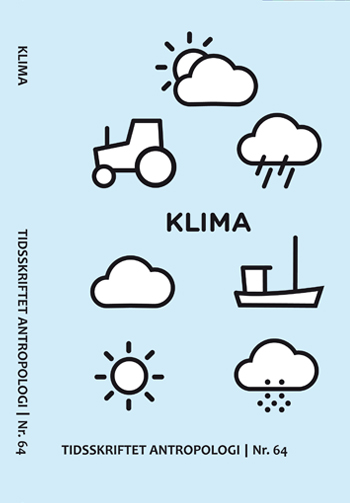I Albertslund er alting skabt af mennesker – selv naturen. Et antropologisk studie af klimaaktivisters sammensatte natursyn
DOI:
https://doi.org/10.7146/ta.v0i64.27324Resumé
Denne artikel undersøger, på baggrund af et feltarbejde blandt unge klimaak- tivister på den københavnske vestegn, hvorledes aktivisterne forholdt sig til de moralske og eksistentielle aspekter af de såkaldt menneskeskabte klimaforan- dringer. Artiklen beskriver og analyserer aktivisternes forståelse af begreberne „natur“, „miljø“ og „klima“ som udtryk for et komplekst og situationelt natursyn, der strækker sig som et kontinuum mellem den selvberoende natur og den men- neskeskabte natur som yderpoler, og med klimaet som omfattende hele spændet. Begreberne og de medfølgende natursyn bliver belyst som narrativer, der praktise- res blandt de unge i den modernistiske og planlagte by, Albertslund. I accept af de menneskeskabte klimaforandringer som et faktum udvider aktivisterne deres allerede indlejrede, miljøbevidste normer og praksisser til en egentlig økologisk kosmologi, der henviser til naturen som en fuldstændigt integreret cyklus af levende væseners, herunder menneskers, og fysiske mekanismers reciprokke forhold af påvirkninger og stofudvekslinger. Konsekvensen af dette er, at skel- let mellem natur og kultur bliver irrelevant, og naturen bliver derved potentielt farlig for mennesker.
Søgeord: klimaforandringer, kosmologi, natursyn, aktivister, natur-kultur-dikotomi, cyklus.
English: In Albertslund Everything is Man-made, Even Nature. An Anthropological Study of Climate Activists’ Comprehensive Idea of Nature
This article inquires into how young climate activists in a Copenhagen suburb came to terms with the moral and existential issues raised by their changing perceptions of their own agency in climate change. The article describes and analyzes how they perceive of “nature”, “environment” and “climate” and how their perceptions are inscribed in narratives of everyday life in planned suburban surroundings. As they became convinced of their own part in climate change, they expanded already embodied environmental norms and practises into articulated climate awareness and an organic cosmology. Within this organic cosmology “environment” and “climate” are regarded as systems of inter-dependent cycles including human beings, and this model of the world is easily transformed into changed social practices, such as saving energy. When transformed into climate awareness these cycles include the entire globe. In addition to this cyclic perception of “environment” and “climate”, the activists practice a perception of “nature” in a dichotomous relation to “culture”. This perception enabled them to act in a moral way on behalf of “nature”, even though it was logically inconsistent with the cyclic perception of “environment”. I argue that these perceptions of “nature”, “environment” and “climate” formed a continuum, and that the activists practised them in various ways, dependent on context. The article accounts for their capacity to act on the threats they saw in climate changes.
Keywords: Climate change, cosmology, perceptions of nature, activists, nature- culture dichotomy, cycle
Downloads
Publiceret
Citation/Eksport
Nummer
Sektion
Licens
Ophavsretten til artiklerne i Tidsskriftet Antropologi tilfalder forfatteren.
Artikler publiceret i Tidsskriftet Antropologi må citeres, downloades og videresendes for ikke-kommerciel brug, under forudsætning af normal akademisk reference til forfatter(e) samt tidsskrift, årgang, nummer og sider. Artiklerne må kun genudgives med eksplicit tilladelse fra forfatter(e) og tidsskriftet.


